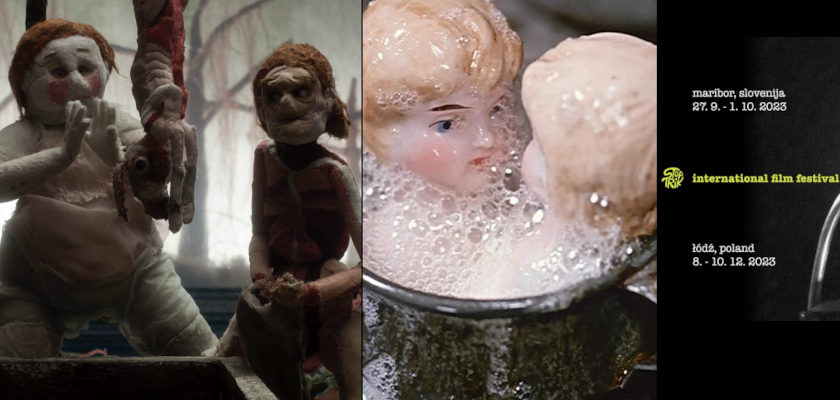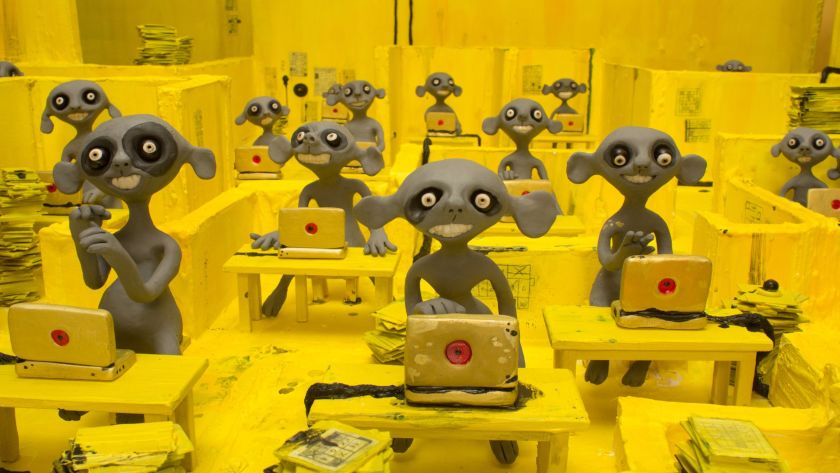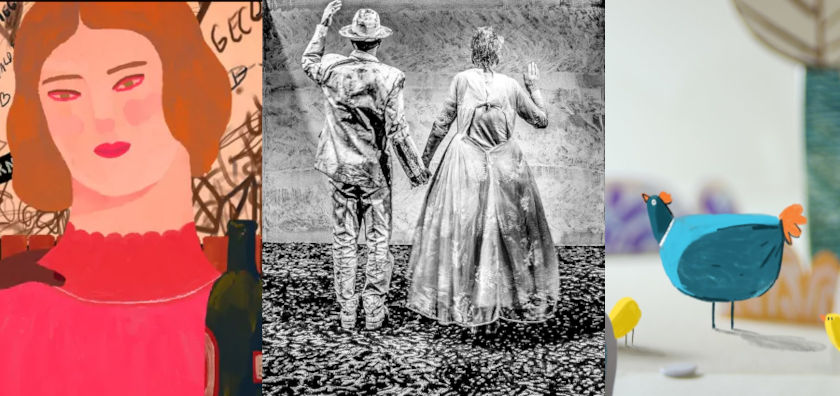Nikola Majdak and Ana Nedeljkovic: Need to Find A Way To Make Digital Frienships Work (Indie Online 2020 Project)
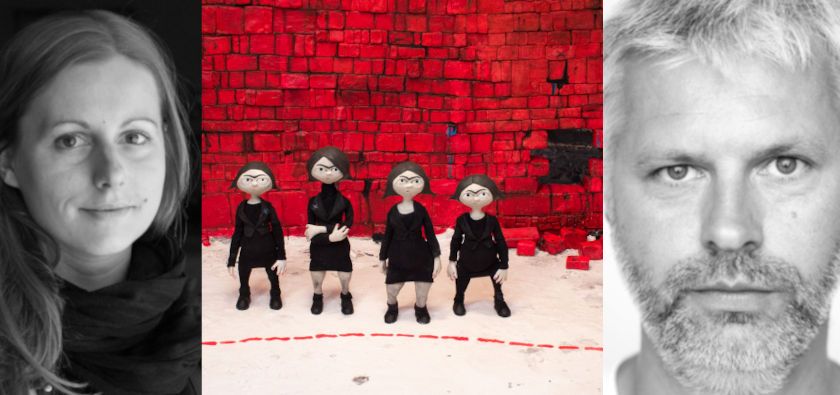
Ana Nedeljkovic and Nikola Majdak have made themselves a stellar career on stop-motion animation, persistently investigating sociopolitical everyday environments in films like Rabbitland (2013, Crystal Bear / Berlin Film Festival) and Untravel (2018, Annie Nomination for Best Short Animated Film). Her latest film, Money & Happiness, is part of the trilogy that investigates the cartography of our social structures. Both directors talked to Zippy Frames on their experience of covid-19 and the boost this gave to online content viewing and consuming; its challenges and benefits. (Part of the Indie Online 2020 project, headed by Michelle Kranot, supported by The Animation Workshop, Viborg).
VK: What's been your experience in attending all these animation and film panels and discussions online? Have we now adapted to the situation, and can we make any more than than just adapting?
Nicola: In the beginning, we thought it would be great, and we'll see a lot of films online. But in the end, we somehow didn't find time in this lockdown to watch animation on the TV screen or on the computer screen. It was confusing not to be at the cinema. Part of the magic of the filmmaking is to watch films at the cinema. So, we just saw some films online at festivals, and that's it. Being at the festival is going to the cinema, where everything is dark ,and there is space, and the projection of animation film on the big screen. You simply have to go there to watch animation. At home, you can watch, cook, and the phone's ringing.
VK: Some people would have made the distinction between watching online screening of films and educational /industry / professional talks.
Ana: It's a complicated question. In the beginning, I had the same feeling with Nicolas that everything is now online, and I'll watch this and that. I was frustrated and anxious, but I realized I didn't have the time because I worked or had to do some other things.
I'm not that cinema person, who believes that you have to be in a big dark room with a lot of people; I found it quite comforting to stay at home and watch most of the films. But the entire issue of animation festivals comes down to two separate things: 1) watching films - I enjoy watching them, even though it's not the best quality but also the 2) festival atmosphere, and communication and making friends is absolutely impossible for me to do it online.
Since March, I haven't left Belgrade apart from a single travel to Croatia. I stopped travelling, attending festivals and meeting people. I found it restrictive; my communication with people around the world is different. I want to meet people in person. I think from time to time is comforting to watch some webinars; that's positive. But attend pitchings and present your projects online (even if I would have to do it next year), I'd rather communicate in person; Nicola and I would not prefer just pitching online, and then somebody's sending us an email afterwards; we'd both prefer to make new friendships in presence.
So, in order to find a way to organize our digital world, we need to find a way to make digital friendships work.
VK: Do you think that festivals did their best during this time of the pandemic? Everyone was caught off guard, especially those March and April festivals. Did they do their best in engaging the filmmakers in this online content world?
A: I still believe that the situation will go back to normal or, at least, 'the new normal'. And somehow by using this experience we'll go back to the real world. I do hope that festival will use this online experience to get a wider audience for their next editions happening physically.
VK: What you're saying is that you see a supporting role for the online content to function, but not the main one.
A: My biggest fear out of this covid situation that we'll easily come to the conclusion: "Oh, it works perfectly in the digital world, and let's stay there". So, we realize that's not necessary to travel to pitchings and film festivals, we can make everything online (which is technically possible), and that a real physical space is not necessary. I think we have to stop that idea.
VK: Some people would say it's more economical not to travel.
N: But we are human beings who like to be together, make friendships and touch things. Digital experience is needed in this situation; but I believe that one day this virus situation will stop, and we'll start doing things again in the same way. Personally, I don't feel digital festival coming to me. If we finish our next film, Money & Happiness, I would be very afraid to put it in a digital platform; I need festivals, audience, hearing comments, Q&As, watching other films at the cinema.
I thought the digital festival opportunity was very interesting; When my father Nicola Majdak was organizing Balkanima Festival and there was a lack of funding, I remember telling him: "You have to go digital, that's the future. Everyone watching from home and they can participate, and you'll have a wider audience". Fortunately, he didn't listen to me. Now I see I would be very wrong to tell him go on a digital platform.
The digital platform is fine because of the situation, for it's the only way to have film festivals. But, on the other hand, is something completely looney. You have fewer number of guests. Films are being watched mostly on laptops (sometimes on the TV screens as well). I don't think this is a festival; it's a kind of platform where you play some films for people to watch it.
At a festival screening I see the people and their reactions. I hear the applause, their laugh, and I find out if our film is doing well or not. In the digital platform, I don't hear anything; I don't have the real reactions of the film festival.
VK: How did the lockdown find your Money & Happiness film? Did you find yourselves with a lot of money and a lot of happiness?
N: Mostly happiness (he laughs). This is the joy of animation, because we can do it in our studio. With all these lockdowns etc., we are still able to produce our films. The film has been funded by the Film Center Serbia (FCS) and the Slovenian Film Center. Just before the lockdown, we got a positive answer from Slovenia; they are participating with Finta company as co-producers. At the same time the Slovenian government froze all funds when the lockdown started, including travelling expenses. We were waiting for a long time (until recently) for their animator to show up in Belgrade. It was just some time ago that the contract was signed between the production company and the Film Fund. So, the project is still in the air, but it goes well.
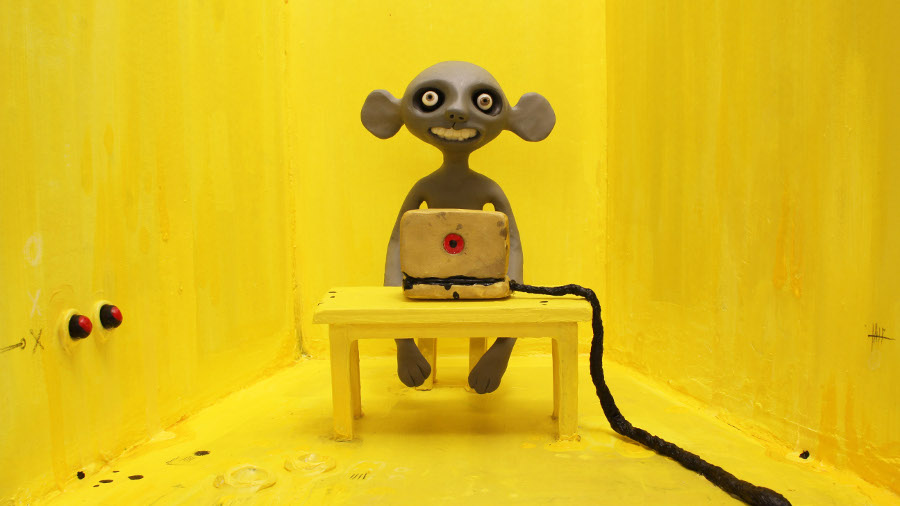
VK: So, did you go on with the film by yourselves during the lockdown?
A: Actually, during the lockdown (and Belgrade had a super-strict lockdown, we were not able to leave our homes for 3 or 4 days in a row), we were only the two of us animating; we were lucky that our studio is not far away from where we live. At least now, we are not locked; so Nicola, our assistant and I work together in a small studio. We're trying to think that everything is normal, and we're shooting the film, but it is tricky: the situation around us is not normal, and it's not easy to completely focus on your work.
What we are shocked about is that our films become reality; Untravel become a reality, and now Money and Happiness, a film about a dystopian world of a perfect economy - the world obviously now faces a new economic crisis. I think that the number of casualties related to the economic crisis will be greater than the number of casualties caused by the virus. So, making a tiny stop-motion animation film about the entire environment and the global economic collapsing is challenging.
VK: It is certainly prophetic in a way. So, the story you're telling me is that you had to isolate yourselves creatively in order to function as artists and filmmakers.
A: Well, the phrase sounds great "to isolate myself as an artist"; but, in reality, I had to do a few different jobs as well. Working on my art film, also as editor of educational programmes at the Belgrade Cultural Center; from time to time, Nicola and I work on some commercial animation as well.
VK: Did you find yourselves financially challenged during the lockdown or perhaps you had more offers during that period?
A: During the first 10 days, I was super afraid that everything will collapse; the pattern we faced was that this job is now cancelled, the next job and payment is being cancelled as well. But I guess we were lucky, and we realized that most of the things and jobs were not actually cancelled. We were able to work, and commissions with a physical component were transferred to their online version (like lectures and workshops). But I think we were lucky. Most artists in different countries, whose projects have to be performed in the real space (musicians, exhibition artists) faced a lot of problems.
VK: So, now it's the time to tell me about the Serbian government and its approach regarding funding during the pandemic.
N: It's not just the Serbian government; it's also the Slovenian government, an EU member; also Croatia has similar problems. Budgets will be cut down. I don't know what will happen; at some point, film funds were cut to half.
The Film Center Serbia implemented a 20% cut on its film funding budget this year, and they prefer to fund more projects for less money each. We don't know what will happen in 2021; we are afraid that the budget is almost empty. I guess we'll have the same type of problem that Slovenia had in 2009, when we had the economic crisis. Their budget was the biggest in the region and it was cut in half -it remains to this figure up to this day. But all these countries have very right-wing, nationalistic governments, which do not want to invest in culture. In October, a comic book exhibition in Belgrade was attacked by right-wing people, because they didn't like what was there, and they destroyed the whole exhibition.
A: The Ministry of Culture said we don't agree with what happened, but we don't agree with the content either; he said that you have to take care of the content of what is exhibited.
VK: So, perhaps animation can get off the hook of censorship or you find yourselves in the same precarious position as well?
A: A lot of people still thinking about our work, "Ok, they're playing with some puppets, and they're going to make some nice cartoons for kids, and some people will get employed there". So, in a way, we are in a safe zone. But, on the other hand, Nicola and I are often interviewed a lot about our films and about the real political situation in Serbia. Of course, these days we are not in focus, because our film premiered two years ago -we're now preparing a new one. But the problem is a general one.
There are two consequences of the entire wide situation. The first one is that we're going to face the real economic crisis, and nobody's telling us the real predictions. Both film and government officials pretend that is business as usual: plan the budget etc. I'm not an economist, I'm painter by diploma, but I think that the budget is empty. And the strategy has to be different; it won't do pretending to have minor budget cuts (5% cut etc.)
The bigger problem is that the entire lockdown empowers the right-wing energy to become stronger and stronger; and when we face the 'new reality' (digital or real), the most difficult part would be to go back to the culture we used to have -and has actually encouraged people to work and survive during the lockdown.
VK: Do you think that the proliferation of the online content culture, which is easily accessible to many viewers, creates a preference for a specific kind of films? Films which avoid thorny issues (politics, LGBT etc), and just be kid-friendly instead.
A: As you know, we are specialized in negative predictions. And this one sounds a very good prediction.
VK: Could you envisage your Rabbitland premiering online?
N: Online is a great opportunity to catch up with some films you missed at festivals. Festivals are something that people gather and exchange experiences, eat and drink wine, exchange cultural differences, and being in the cinema. This is the whole point of doing things.
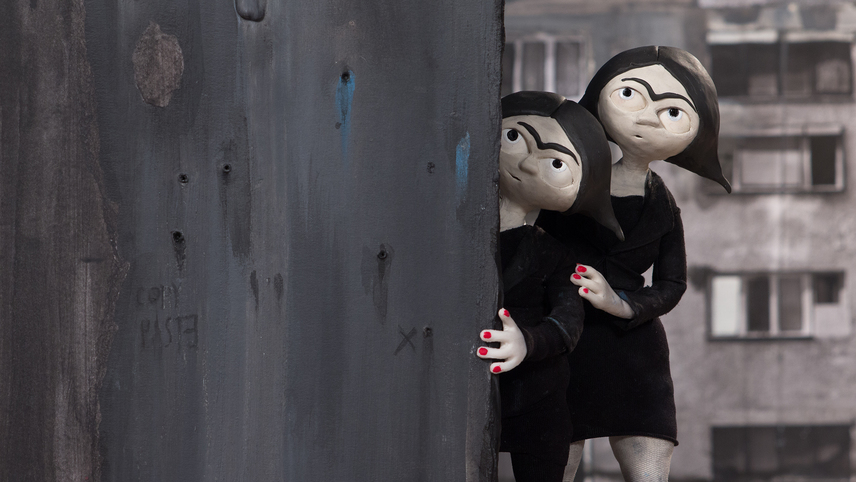
We now have platforms, and cable TVs and other stuff for watching films, but it's very tricky. But in all this enormous amount of films, you still need to have a list and watch films. When you go at a film festival, there's a selection committee and puts, let's say, 10 films together in one evening. This is a great way to compare films and evaluate them -you think about them. In the platforms, you always have this "Next" feeling, one after the other. Perhaps you can watch 3 or 5 minutes, and at the same time I need to go to the toilet.
Being at a cinema is magic. This is still one of the big issues of filmmaking. We now have to stay at home and take advantage of the offering. But as soon as this finishes, we have to go back to festivals. That's the point. In that sense, we can sit at home all the time, not even going on vacation, because we're going to spend money anyway.
VK: Does the online thing actually impose you to a kind of self-censorship? If part of Rabbitland deal was to premiere it online, would you actually think of censoring yourself in order to address a bigger audience or avoid negative reactions?
A: Fist of all I would never censor myself.
N: Me neither.
A: When we're working on our films, we were always thinking of a larger audience, and communication with different kinds of people. It was not made for just some animation professionals. But the most frustrating issue that I found about online screenings and online premiering is that we feel that we live in the very beginning of the digital culture. Nowadays, Internet is the biggest garbage bin that ever existed. And it is so chaotic and unorganized that it becomes frightening. That's my biggest problem with the online content. You may post something today, go to sleep, and then the next morning you have billions of comments and threads -mostly without any reason.
You may have a politically charged film with just 10 likes or comments as "I like the colors", or you may have the completely opposite reaction. So, Internet needs somehow to be organized. What also frightens me is that this Internet content is privately owned. All content regulators are private, corporate companies. So, our old idea of politics and censorship (like the one you had in Ceaușescu's Romania) now happens in a different way.
N: All these platforms belong to private corporations; and there is an increased occurrence of both right-wings and fascism in a way, but nobody cares about ; everything can be censored and there's no difference if there's something art and not some just nude photo, for instance. You would need governmental restrictions.
A: I have a perfect idea. It's a perfect time for you as Zippy Frames to develop a platform for independent animation, and transform it into something bigger and bigger, but also to provide a safe place for all of us. It's probably an utopian idea, but since Internet is owned by private corporation, the idea is to make your own private space and then to make it open enough.
VK: The issue here is accountability. If a festival goes wrong, you know who to blame for. If YouTube or Facebook goes wrong, you can always blame Mark Zuckerberg, but he will never respond personally or his team to any of your emails.
N: We're still human beings, not robots who go digital on platforms. We're using our hands and minds to meet people and travel. This is the joy of being a human being. Digital should support our humanity, but it doesn't happen that way.
VK: What are your feelings now we are 6 months into this pandemic situation? Are you more optimistic or more dystopian now?
A: We are from Serbia, so we are perfectly familiar with the idea that the Universe will collapse tomorrow, and that we will continue living somehow. So, we're practicing it quite a lot, and I would say I am somewhere near the 5th or the 6th Apocalypse in my own life. So, in that way, I'm not particularly frustrated. But I feel more comfortable with problems where I could see the enemies (planes and bombing and so on); that's why I don't like the virus situation.
N: The government are using the virus as an excuse. Who will say when it will end? The Prime Minister of each country? The WHO? Trump? And how are we to trust them and their numbers? I was every optimistic during the lockdown; I was thinking that by May we will have finished; but after a period when most things were open, we now lock countries one by one again (Slovenia, France etc.). The government says at 6pm you have to be at home, and that's it.
A: And people are super-obedient.
N: This looks like Orwell's 1984. It's not a book, it's a manual.
A: We have an extra package of government measures, and at the same time, people getting more and more rich. What are we going to face very soon is that social inequality will be on the rise. The virus story is not the only story; it's a story about class struggle as well, and social differences, and travel bans. People are not able to live like this, and I'm afraid it will explode in some social and political way.
N: The Serbian government did not give a relief fund to freelance artists, but to the companies who already have private owners. Artists were asking for months to get support; in the end, they said OK, but they emptied the budget for culture.
VK: And where did this budget go? To health services?
N: There are several buildings in Belgrade, which cost from 4000 to 7000 EUR per square meter.
A: Most of them recently bought in cash.
N: 80% of the apartments bought in the last 360 days are paid in cash. Face masks before corona cost 10 cents, now a single one costs one Euro. So, imagine where this money goes to, 10 times its original price. And this goes to private construction.
A: The construction industry ran wild during the lockdown, and they are technically building a new city.
VK: So, these people have both money and happiness.
A: They are building the perfect utopia; the only problem is that this utopia is not for us.
N: We started out with cities and their structure, but now with the digital lockdown and the corona situation, we are spreading our ideas more and more. We have everything we need for our inspiration from the current reality, and all those creepy far-right politicians from all over Europe (Serbia, Slovenia, Hungary, Poland for instance). This dangerous virus is spreading more than corona. You can either get corona or not. But with fascism, you are definitely getting it -and that's it. It sucks your body, your blood and your brains.
A: It's a perfect environment for all those evil forces to spread together their virus.
VK: What is the funding future for your next project?
N: We're developing a feature film script at the moment, about building Utopian cities and lives. We applied at the Film Center Serbia, and we're waiting for their response in the upcoming weeks. Don't know their policy; if they decide to either give the funding to a few projects or they will decide to spread the funding in as many projects as they can [Update Feb 2021: Financial support for the New Rabbitland animation feature has now been awarded to the two animation directors]
VK: If some Martian creative people in the future got stuck in Serbia, and they had to experience the same coronavirus situation that you face now, what would be your advice?
A-N: Run away!
A: I have a modified proposal. "Welcome to Serbia, the land of opportunity. If you're an artist, you're absolutely in the wrong place. But if we had to give you an advice, you have to join the party, and try and make your own business. The best thing would be to buy something and sell it as soon as possible for 10 times its original price. And when you get a lot of money, you can probably be at home and make your own films and get inspired by the entire situation". I would immediately add if I could go along with them.
N: But if they come from Mars and have more advanced technology etc, perhaps I could persuade them to change along with me the political situation in my country and the region. Can you make the politicians disappear?
A: I have another answer. The right answer would be "Dear Martians, do you know how to cure us from the virus?" Actually, I would welcome the Martians and the virus scenario as a case of fiction; but virus continuing without the Martians, no, thank you.
- Read Also: Our Interview Series on Independent Animation Online (Indie Online 2020 Research Project)
About Nikola Majdak and Ana Nedeljkovic
Ana Nedeljković was born in Belgrade in 1978. She graduated in painting from the Faculty of Fine Arts in Belgrade. She was awarded a PhD in art practice at the same faculty. She is a visual artist working in the media of drawing, installation and animated film, and is also active in art education.
Nikola Majdak Jr. was born in Slovenia in 1972. He has an MFA from the Faculty of Dramatic Arts in Belgrade, camera department.For the past 20 years he has been a freelance cameraman, animator, director and lecturer.
Their first film "Rabbitland" (2013) was awarded the Crystal Bear at the Berlinale. It has also received numerous other awards and has been shown at more than a hundred festivals worldwide. Their second film “Untravel” (2018) was also screened at numerous festivals including Berlinale, Annecy and Sundance, and nominated for the Annie Award.
The interview was conducted October 2020 (interviewer Vassilis Kroustallis). It is part of the Indie Online 2020 research project, headed by Michelle Kranot and supported by The Animation Workshop/VIA University College, Center for Animation, Visualization and Digital Storytelling, Denmark.Viborg.




